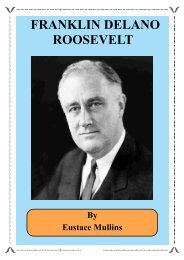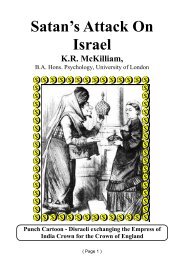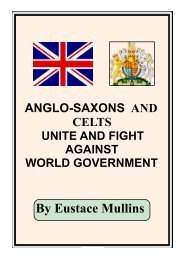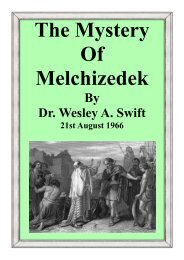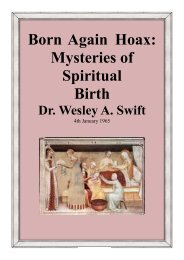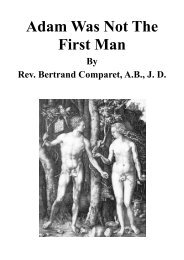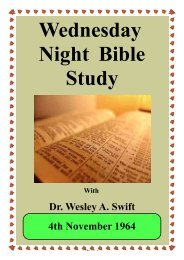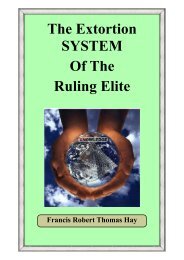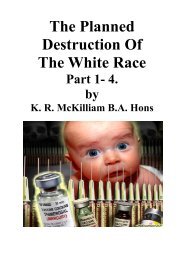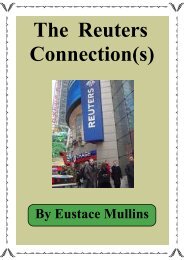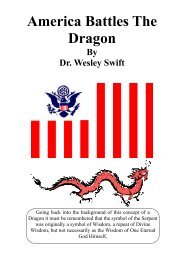Curse of Cannan - The New Ensign
Curse of Cannan - The New Ensign
Curse of Cannan - The New Ensign
Create successful ePaper yourself
Turn your PDF publications into a flip-book with our unique Google optimized e-Paper software.
make sure that even if the French nation survived the Revolution, it would never again present<br />
a threat to the ambitions <strong>of</strong> the British Empire. This proved to be the outcome.<br />
Mirabeau later was overcome by the developments <strong>of</strong> the Revolution; in a moment <strong>of</strong> remorse,<br />
he conspired to save King Louis from the guillotine. To avoid a public trial, he was promptly<br />
poisoned by the conspirators, thus sealing his lips against any future revelation <strong>of</strong> the identity<br />
<strong>of</strong> the true perpetrators <strong>of</strong> this horror.<br />
In King Louis' final days <strong>of</strong> power, measure after measure was enacted which served to further<br />
weaken the authority <strong>of</strong> the Crown and fed the appetite <strong>of</strong> the mob. For instance, the National<br />
Assembly resolved to set an example by suppressing slavery. According to the Encyclopaedia<br />
Britannica, the measures which they enacted, forbidding any retaliation against slaves, "set the<br />
stage for the terrible negro insurrection in Santo Domingo." In fact, the entire white population<br />
was slaughtered, being replaced by a black government which is today the poorest nation in the<br />
Western Hemisphere. <strong>The</strong> Assembly also abolished feudal tenure in France, which violated the<br />
rights <strong>of</strong> certain Princes in Alsatia, which had been guaranteed them by the Treaty <strong>of</strong> Westphalia.<br />
Foreign statesmen saw that France was sinking into anarchy, which gave them free rein to pursue<br />
their own policies, without fear <strong>of</strong> any French intervention. King Louis' Minister <strong>of</strong> Finance, the<br />
Swiss banker Necker, was true to his heritage <strong>of</strong> revolutionary intrigue. He deliberately pursued<br />
policies <strong>of</strong> inflation which caused terrible economic suffering in France, and further inflamed<br />
the populace. He is thought to have inaugurated those policies in obedience to certain Swiss<br />
bankers who planned to reap great pr<strong>of</strong>its from the approaching French debacle. After all, it was<br />
no less than Baron Rothschild who advised those who wished to become wealthy that they should<br />
"buy when there is blood in the streets."<br />
On the tenth <strong>of</strong> October, 1789, Talleyrand proposed the confiscation <strong>of</strong> all the church lands in<br />
France. This was thought to be one- fifth <strong>of</strong> all French land. This was proposed as an economic<br />
measure; the famous assignats were issued against these lands, in the amount <strong>of</strong> four hundred<br />
million livres, which was later increased to one billion eight hundred thousand livres. His work<br />
done, Necker now resigned and left France in September <strong>of</strong> 1790. During the ensuing three years<br />
<strong>of</strong> the Convention, more than seven billion livres were issued. <strong>The</strong>ir value fell to one per cent<br />
<strong>of</strong> their face value.<br />
<strong>The</strong> inspiration for the French Revolution can be traced directly to the doctrine <strong>of</strong> secular<br />
humanism which had been formulated at the Accademia <strong>of</strong> the de Medicis in Florence, and which<br />
were but a moderrnized version <strong>of</strong> the Kabbalah. <strong>The</strong> placing <strong>of</strong> "human interests" first in all<br />
things created the climate which made possible the guillotining <strong>of</strong> King Louis XVI; after denying<br />
God, it was a simple step to deny the authority <strong>of</strong> a monarch who ruled by divine right. From<br />
the Neoplatonic humanism promulgated by the de Medicis came the cults <strong>of</strong> the Rosicrucians<br />
and Freemasonry. Sir Francis Bacon's dictum that "knowledge is power" threw down the gauntlet<br />
to the traditional powers <strong>of</strong> Church and State, which were then cast aside during the Revolution.<br />
<strong>The</strong> Baconian Doctrine logically developed into the Positivism <strong>of</strong> Comte, who states that "God<br />
is only an abstraction--he does not exist; only humanity is real" <strong>The</strong> Enlightenment <strong>of</strong> Descartes,<br />
surreptitiously aided by the secret alliance between Voltaire and Frederick the Great, both<br />
Freemasons, led France into the excesses <strong>of</strong> the Revolution.<br />
<strong>The</strong> immediate plans for the French Revolution had been laid at the international convention <strong>of</strong><br />
Freemasons at Wilhelmsbad in 1781, a gathering later famed as "the Convent." It was attended<br />
by seven brothers from England, including Lord Shelburne, who later directed the progress <strong>of</strong><br />
the French Revolution from London, Lessing, Mirabeau, Dohm, delegates from the French<br />
Illuminati, and Knigge, who represented Weishaupt. "<strong>The</strong> Convent paved the way for the French<br />
Revolution" (A. Cowan, "X-Rays in Freemasonry," pp. 67-68). <strong>The</strong>re were some 2000 lodges<br />
in France in 1789, with over 100,000 adepts. <strong>The</strong> first lodge in France had been set up by Lord<br />
Derwenwater <strong>of</strong> England, paving the way for the later influence <strong>of</strong> Lord Shelburne and British<br />
Intelligence.<br />
( Page 58)



